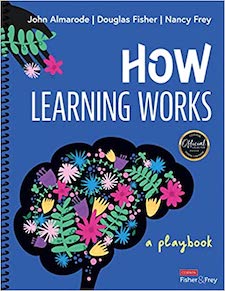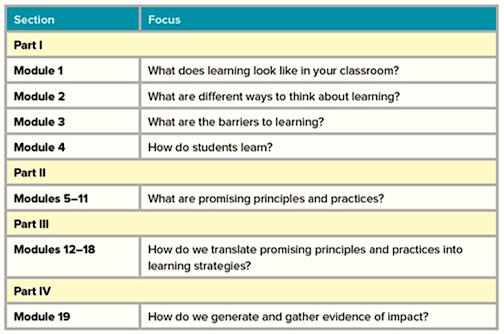How Learning Works: A Playbook
[ad_1]
How Understanding Works: A Playbook
By John Almarode, Douglas Fisher and Nancy Frey
(Corwin Press, 2022 – Understand extra)
Reviewed by Anne Anderson

Be organized to do some hefty obligation considering, reflecting, and responding with this textual content. You will also want your private “write-on” copy of How Understanding Will work. Through the spiral-certain e book, you will reply, reflect, explain, explain, and show proof of your personal discovering.
The authors may possibly be common to educators who have followed the do the job of John Hattie and his colleagues, such as Almarode, Fisher and Frey. Corwin’s collection of playbooks devoted to numerous factors of this operate would fill a bookshelf!
On site 5 you will come across this overview of the How Mastering Operates playbook.
Within these modules audience locate applications, prompts, and things to do to utilize a range of instructional procedures in their lecture rooms. Throughout the book the authors have integrated QR codes for video clips, templates, and additional assets. The playbook, along with its accompanying assets, is an fantastic selection for administrators and educational coaches to use in PLCs.

The modules in Section II focus on these promising principles: commitment, interest, elaborate encoding, retrieval and follow, cognitive load, successful battle, and comments. Every single chapter begins with an clarification of the promising basic principle and concludes with a examine for comprehension.
My crucial takeaways from Part II
Module 6, Promising Theory 2: Focus
“Attention is our ability for pinpointing, selecting, and focusing our cognitive methods on particular stimuli.” (p.56) In this module, readers are invited to checklist particular influences that have an effect on their students’ notice. Most lecturers will uncover there is not ample room for this checklist!
Subsequent that is a dialogue of three aspects that affect notice:
- Prior Expertise and Studying
- Deep Determination
- Recognition/Notice/Engagement
The authors go over how this principle or exercise might seem in a classroom. Then they advise four practices from the investigate on attention to assistance tackle the troubles in today’s classrooms. The reader is challenged to aim on strengthening attentiveness in their classroom.
Module 11, Promising Theory 7: Suggestions
“Feedback is the glue that retains the acquisition, consolidation, and storage of mastering collectively.” (p.110)
The providing and getting of feedback has the prospective to propel mastering ahead for all college students. The authors reference John Hattie’s 2012 research suggesting that academics address these a few issues:
- Exactly where are we going?
- How are we going?
- Wherever do we go upcoming?
The authors share examples of studying intentions and accomplishment criteria from mathematics, science, English language arts, and social experiments. After finishing the accompanying chart describing the aim of this feed-back, visitors have perception into what is necessary to shift understanding forward. The authors remind viewers that feed-back “needs to come at the ideal time, customized for the specific learner and their discovering, and focus on shifting discovering forward.” (p.114)
What you will discover in Part III
The modules in Element III address these express tactics: goal placing, integrating prior information, summarizing, mapping, self-testing, and elaborate interrogation.
Learning Approach 5: Self-Tests
“Self-screening occurs when learners answer to very low-stakes practice issues about formerly figured out substance.” (p.180) Audience are invited to finish a chart describing how self-testing rewards commitment, consideration, elaborate encoding, retrieval and apply, cognitive load, productive battle, and feed-back. As the authors carry on to lay the basis for self-tests, a graphic (summarized below) demonstrates the system.
➡︎ Learners should receive a instrument kit and gather methods to assist their self-tests.
➡︎ Learners will have to align the instruments and sources they decide on with the distinct learning outcomes communicated through the understanding intention and accomplishment conditions.
➡︎ Learners have to know where to go to give and acquire opinions.
What then follows is an explanation of how this learning approach may be introduced in the classroom.
The ultimate module, Creating and Collecting Proof, guides readers in assessing the impression of the science of mastering and these techniques in their lecture rooms. This evidence “guides us in earning conclusions about what comes about up coming in our training and their finding out.” (p.215)
Gaining insights into your students’ mastering
How Discovering Performs: A Playbook presents educators with studying approaches our college students want to become unbiased learners. Yes, you will have to make diversifications to these tactics. Yes, you have to research the evidence to verify that understanding has occurred. Some times – some months – it may well be sluggish likely, but hold on maintaining on. “When we assemble proof via looking at and listening, we achieve perception into learners’ comprehending, inclinations, and motivations.” (p.215)
Anne Anderson usually realized she wanted to be a trainer. She graduated from East Texas Baptist University with an English major and Background insignificant and did graduate operate at Louisiana Condition College and Louisiana Tech College. Following training 8th graders for 24 a long time, Anne served as a articles mentor. Considering that retiring in 2011, Anne has labored as an educational marketing consultant, presenting at national conferences and onsite trainings for community and personal universities.
Calendar Celebrations: September, Oct, November is portion of Anne Anderson’s trilogy on methods for months of the faculty calendar year. (For MiddleWeb she wrote about chosen tumble celebrations below, about spring here and about winter below.) Anne has also released articles or blog posts in Strategies Furthermore and Voices from the Center, publications of the National Council of Academics of English. She is a recurrent reviewer of specialist books for MiddleWeb.com.
[ad_2]
Supply connection








